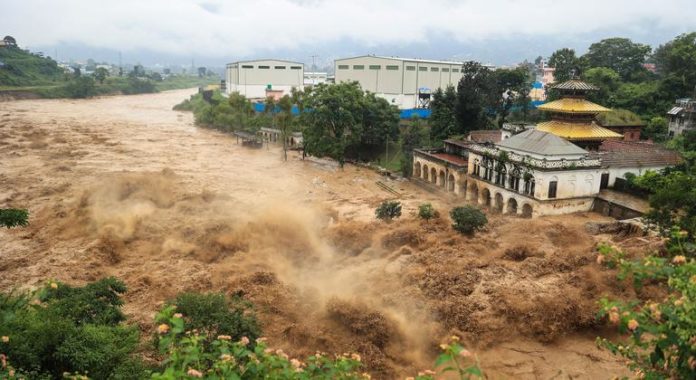Many of the deaths have occurred in the capital, Kathmandu, which witnessed the most intense rains in over half a century. Hundreds of houses along with schools and hospitals have been damaged and the southern portion of the city remains inundated.
The rains, which began on 27 September, and lasted more than 72 hours, also caused extensive damage outside the capital. Forty-four of Nepal’s 77 districts have been affected, and many areas are cut off, with bridges and roads swept away and powerlines and telecommunication networks disrupted.
Security forces and volunteers have rescued about 4,500 people. It is estimated that over 7,600 families have been severely affected, many of whom lived in informal settlements that have washed away.
Furthermore, as water pumps, pipes and cropland have been damaged, access to water and food and their affordability, could become a major challenge in coming days.
Concern for children
In response to the disaster, UN humanitarian teams alongside the Government and partners have mobilised rapidly to deliver aid and assess damage.
Emergency teams from UN Children’s Fund (UNICEF), for instance, are distributing vital supplies, including hygiene kits, water purification tablets, blankets and mosquito nets, a spokesperson told UN News.
Florine Bos, Chief of Communications at UNICEF Nepal said the agency has also set up a medical tent to temporarily replace a major hospital that was destroyed, potentially reaching 2,000 people with healthcare.
She also highlighted that children are at heightened risk of violence, abuse and exploitation, especially with many schools closed after being damaged.
“We are very worried about children’s access to schools. Schools are not only for learning, but they also are a safe place where children meet their friends and play,” she said.
“We hope that the schools will open soon,” she added.
‘Unprecedented disaster’
Azmat Ulla, head of the International Federation of Red Cross and Red Crescent Societies (IFRC) Nepal country office, emphasized the unprecedented nature of the disaster.
Speaking to the media at a briefing in Geneva via video link from Kathmandu, he said that access to essential resources, such as fresh water, will be a challenge in the coming days and once the floodwaters have receded, there is the threat of water and vector borne diseases such as dengue.
“There are still many villages which are isolated due to impassable roads and broken bridges…the Nepal Red Cross and IFRC have been coordinating with the local authorities to clean roads and access people in need, and these efforts are making a difference,” Mr. Ulla said.
A view of flooded areas of southern Kathmandu, the capital of Nepal, following heavy rainfall lasting several days across the country.
While its teams are engaged in immediate relief efforts, the Red Cross is also preparing for long-term recovery, including the launch of a humanitarian appeal, he added.
“As Nepal faces the increasing threat of climate change, which has intensified disasters like this, preparedness within communities will be the key,” he said.


